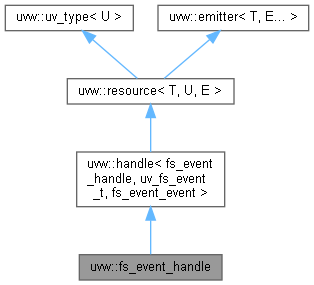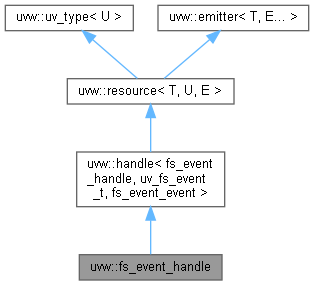The fs event handle. More...
#include <fs_event.h>
Inheritance diagram for uvw::fs_event_handle:

Collaboration diagram for uvw::fs_event_handle:

Public Member Functions | |
| int | init () final |
| Initializes the handle. | |
| int | start (const std::string &path, event_flags flags=event_flags::_UVW_ENUM) |
| Starts watching the specified path. | |
| int | stop () |
| Stops polling the file descriptor. | |
| std::string | path () noexcept |
| Gets the path being monitored. | |
 Public Member Functions inherited from uvw::handle< fs_event_handle, uv_fs_event_t, fs_event_event > Public Member Functions inherited from uvw::handle< fs_event_handle, uv_fs_event_t, fs_event_event > | |
| handle_category | category () const noexcept |
| Gets the category of the handle. | |
| handle_type | type () const noexcept |
| Gets the type of the handle. | |
| bool | active () const noexcept |
| Checks if the handle is active. | |
| bool | closing () const noexcept |
| Checks if a handle is closing or closed. | |
| void | close () noexcept |
| Request handle to be closed. | |
| void | reference () noexcept |
| Reference the given handle. | |
| void | unreference () noexcept |
| Unreference the given handle. | |
| bool | referenced () const noexcept |
| Checks if the given handle referenced. | |
| std::size_t | size () const noexcept |
| Returns the size of the underlying handle type. | |
| int | send_buffer_size () |
| Gets the size of the send buffer used for the socket. | |
| int | send_buffer_size (int value) |
| Sets the size of the send buffer used for the socket. | |
| int | recv_buffer_size () |
| Gets the size of the receive buffer used for the socket. | |
| int | recv_buffer_size (int value) |
| Sets the size of the receive buffer used for the socket. | |
| os_file_descriptor | fd () const |
| Gets the platform dependent file descriptor equivalent. | |
 Public Member Functions inherited from uvw::resource< T, U, E > Public Member Functions inherited from uvw::resource< T, U, E > | |
| template<typename R = void> | |
| std::shared_ptr< R > | data () const |
Gets user-defined data. uvw won't use this field in any case. | |
| void | data (std::shared_ptr< void > udata) |
Sets arbitrary data. uvw won't use this field in any case. | |
 Public Member Functions inherited from uvw::uv_type< U > Public Member Functions inherited from uvw::uv_type< U > | |
| virtual int | init () |
| Initializes the handle. | |
| loop & | parent () const noexcept |
| Gets the loop from which the resource was originated. | |
| const U * | raw () const noexcept |
| Gets the underlying raw data structure. | |
| U * | raw () noexcept |
| Gets the underlying raw data structure. | |
 Public Member Functions inherited from uvw::emitter< T, E... > Public Member Functions inherited from uvw::emitter< T, E... > | |
| void | on (listener_t< U > f) |
| Registers a long-lived listener with the event emitter. | |
| void | reset () noexcept |
| Disconnects the listener for the given event type. | |
| void | reset () noexcept |
| Disconnects all listeners. | |
| bool | has () const noexcept |
| Checks if there is a listener registered for the specific event. | |
Detailed Description
The fs event handle.
These handles allow the user to monitor a given path for changes, for example, if the file was renamed or there was a generic change in it. The best backend for the job on each platform is chosen by the handle.
To create a fs_event_handle through a loop, no arguments are required.
See the official documentation for further details.
Definition at line 67 of file fs_event.h.
Member Function Documentation
◆ init()
|
finalvirtual |
◆ path()
|
noexcept |
Gets the path being monitored.
- Returns
- The path being monitored, an empty string in case of errors.
◆ start()
| int uvw::fs_event_handle::start | ( | const std::string & | path, |
| event_flags | flags = event_flags::_UVW_ENUM |
||
| ) |
Starts watching the specified path.
It will watch the specified path for changes.
As soon as a change is observed, a fs_event_event is emitted by the handle.
Available flags are:
fs_event_handle::event_flags::WATCH_ENTRYfs_event_handle::event_flags::STATfs_event_handle::event_flags::RECURSIVE
- Parameters
-
path The file or directory to be monitored. flags Additional flags to control the behavior.
- Returns
- Underlying return value.
◆ stop()
| int uvw::fs_event_handle::stop | ( | ) |
Stops polling the file descriptor.
- Returns
- Underlying return value.
The documentation for this class was generated from the following file:
- src/uvw/fs_event.h